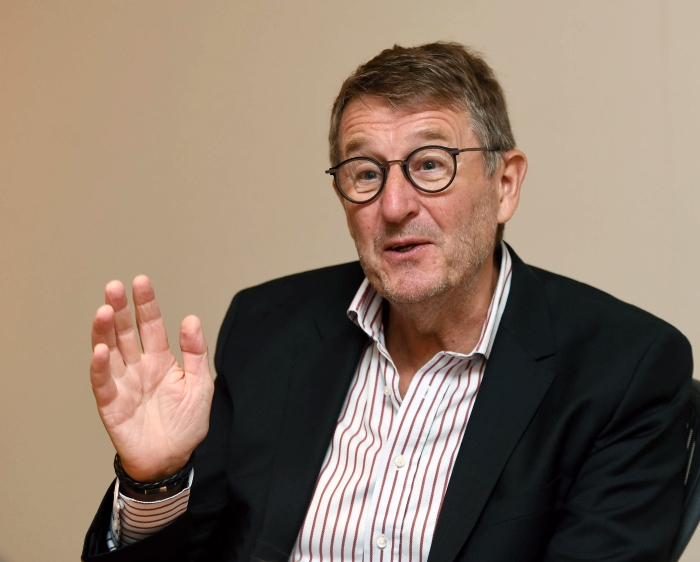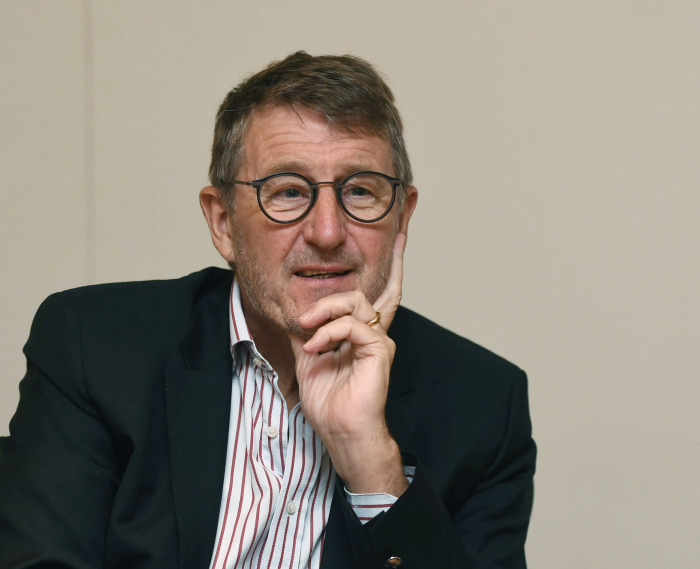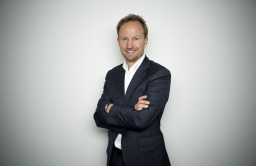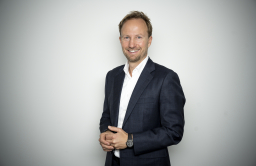-
KOSPI 2577.27 -2.21 -0.09%
-
KOSDAQ 722.52 -7.07 -0.97%
-
KOSPI200 341.49 +0.02 +0.01%
-
USD/KRW 1396 -2.00 0.14%
EQT chairman sees technology and services as attractive sectors in Korea
Private equity
EQT chairman sees technology and services as attractive sectors in Korea
The Swedish PE firm future-proofs portfolio companies with digital transformation and sustainability to create a better return
By
Dec 15, 2021 (Gmt+09:00)
long read
News+

High price tags of target companies can be justified if you understand long-term trends of the industry and have expertise in the sectors, Conni Jonsson, founder and chairman of Swedish investment company EQT Partners AB, said in an interview with The Korea Economic Daily.
EQT buys good companies in attractive sectors, normally at high prices, makes them better and sells them at even higher prices, he said.
EQT is under the umbrella of the Wallenberg family of Sweden. Backed by the family’s investment holding company, Investor AB, the private equity firm manages assets of around €70 billion. Its share price has soared 800% since the company went public in 2019.
The firm recently hired two Korean investment managers to begin investing in Korea.
The following is a transcript of the interview with Mr. Jonsson during his recent visit to Seoul.
▲The core strategy of EQT is to future-proof portfolio companies by supporting digital transformation and instilling sustainable practices. Could you elaborate on the concept of future proofing? What kind of companies does EQT invest in and how does it raise their values?
"We’d like to buy good companies because the better the companies, the easier you can improve them and raise their corporate value. If you buy a company that is not well managed, you need time just to fix the basics and start to invest with a timeframe, which is six to nine years."
"Therefore, we buy them as good companies, invest in and transform them while taking into consideration what will happen in the industry. In doing that, technology is a very important component as it impacts every type of business today. We are using technology and digitalization as tools to future-proof companies that are best equipped to meet future challenges. We are adding the same logic to ESG investment."
"It will create a much better return if you're selling a company that is future-proofed from a technical and environment, social and governance (ESG) perspective."
▲So, the first step is to locate a good company?
"First, the companies have to operate in a good industry. Therefore we find attractive sectors first and look for the best companies in those sectors. We normally pay high prices for them. Then, we make them even better and get better prices when we sell them. People like to buy them because they are the market leaders and of good quality in an attractive sector."
▲How does this concept of thematic investing help EQT increase the value of the companies despite the pandemic?
"If we decide on which sectors we should invest in, that means we can build up expertise in those sectors. If we invest in everything, we cannot have a good take on everything. For example, we’re more informed in fiber network investment than other buyers are. There are different elements such as the fiber trunk, middle section and end consumer sector. We can either buy an integrated fiber company, the last-mile fiber company or a carrier that uses fiber as we have expertise. Also, we can attract the best people because we have more expertise in certain fields. The best people like to work with organizations that know what they’re doing."
▲EQT’s key themes include software, healthcare and business service, which are the most competitive areas nowadays. How does EQT increase their values when they’re already high?
"As long as we understand the long-term trends, we should be able to increase the values. For example, we can have a strong conviction that people will spend more money on pets. We have diverse investments in pet shops, pet insurance and veterinary clinics. The pandemic-driven isolation will lead some people to want to buy a pet even if the pandemic is gone. If we get the long-term trends right, we can justify the prices and still create value in these companies."
"Actually, we came from being a generalist, investing in everything in the places where we operated, in the initial 10 years. Then we realized this is not smart. For the last 15 years, we have been working on specializing ourselves. All the disruptions we have seen only sped up during the pandemic. So, being a specialist has actually helped us."
▲How does EQT support the digitization of the portfolio companies?
"EQT has its in-house digital-focused team employing around 80 software engineers, data scientists and artificial intelligence experts. The team leads the digitization of EQT and the portfolio companies. We have also developed Motherbrain, a platform for EQT Ventures to find the best tech startups to invest in. EQT Ventures has been tracking dealmaking in AI platform Motherbrain since 2016, capturing thousands of assessments and leveraging the platform, which continues to evolve."
▲You worked for Investor AB, the holding company of Sweden’s Wallenberg family, for seven years and founded EQT in 1994 based on the family’s business management philosophy and culture. How does the strong ties with the Wallenbergs differentiate EQT from other private equity firms?
"The people who founded US private equity firms in the 1970s, such as KKR and Blackstone, were investment bankers and smart dealmakers. They set up a buyout fund and did the same as the bank was doing – bought, leveraged and sold companies. But they had to find a way to create more value as it became so competitive in the private equity industry. When we founded EQT in 1994, we started to think about value creation through corporate management. As the Wallenbergs have been managing companies for five generations, we mixed the family’s approach to company management with the financial toolbox."
"During the first 10 years of EQT, we talked about governance and nobody cared at the time. So we set up the principles for corporate governance. The companies will be governed by an independent board with a chairman that is a senior industrial person. Then we have one or two EQT people on the board while other board members are industry experts to make sure that the company is developed in that area. This way, focusing on the company’s growth, has differentiated us from some other private equity firms. Today, more private equity firms are talking about value creation to make profits. We started to think about governance and value creation much earlier, and this is the Wallenbergs' influence."
"In addition to governance, we find a way to cohabitate and work together with the communities where we have companies. Wallenberg family’s management philosophy is to work with the stakeholders, such as labor unions and regulatory authorities, and this helps EQT secure deals out of Northern Europe. For example, we’ve competed with Blackstone and KKR and acquired a German company as the company’s labor union valued our philosophy. The Wallenbergs’ tradition is to consider how the investment will affect the world and sustainability. Even though EQT doesn’t have an impact fund, all of our investments have an impact on the world. We are using the same rule to invest in South Korea."

▲You have recently hired two Korean investment experts in infrastructure. Why do you start with infrastructure in Korea?
"That was more of an internal human resource issue. We will be here with all the basic business lines, including infrastructure and venture capital, over time. Asia is of strategic priority, and we have very important customers in Korea. I’ve traveled to Korea many times and we are very acquainted with the country."
▲What are the main themes when you invest in Korea?
"One of the themes is information technology. You can invest in the technology of Korea and globalize it. Another attractive theme is services. The proportion of services in the Korean economy is still small, and that is an interesting opportunity for us because we’re good at IT services. These could be business services, consumer services and other services we can create values from. Also, fiber is a good theme. We are experienced in telecommunication infrastructure and probably can create great investment opportunities."
▲How about investing in carve-outs from Korean conglomerates?
"Of course, that is an interesting opportunity as well. We have worked with family businesses in Europe for many years. They want investors who seriously think about companies’ futures and cooperate with stakeholders. I believe EQT’s culture, deeply influenced by the Swedish Wallenberg family, will positively work when we collaborate with Korean conglomerates."
▲EQT has various investment portfolios across private equity, venture capital, real estate, infrastructure and public value as other global asset managers do. But in an interview with the Financial Times a couple of years ago you stressed that EQT is different. Can you elaborate on the difference?
"We have recently sold the credit business and there are two reasons for that. Firstly, it was very difficult to have our value-add approach. We are good at acquiring companies' management rights, increasing business and creating values. But if you just lend money to the company, you don’t run the company."
"Secondly, we would like to focus on things that we can make a difference from. We would like to grow in areas that we create values from. EQT has high margins compared with the asset base while some other private equity firms see their margins drop despite AUM increases. So, we have a better value-add business and the stock market recognizes it well. Our share price has risen 800% since listing in 2019."
▲How do you align the interests of partners with those of shareholders?
"We discussed it a lot before we went to the IPO. I don’t think there have been any conflicts of interest. If we make high profits for our clients, it benefits both the clients and the shareholders. It is the same as when a carmaker sells good cars to customers, increases profits and gives high returns back to its shareholders."
▲Doesn’t a high carried interest mean reduced returns for shareholders?
"We have set the carried interest rate when we did the IPO, which enables shareholders to predict the carried interest for the fund managers. It's very transparent. Rather, we have concerns about the IPO as some partners left us after our share prices soared. On the other hand, we have been more competent in securing talent as the IPO has made our brand stronger. Now we're a household brand and people understand what we stand for. So as a way to win the fight of the talent market, the IPO was very important."
Write to Chang Jae Yoo at yoocool@hankyung.com
Jihyun Kim edited this article.
More To Read
-
 Sustainable investingEQT doubles down on sustainability and digitalization to fuel returns
Sustainable investingEQT doubles down on sustainability and digitalization to fuel returnsNov 17, 2021 (Gmt+09:00)
-
 Private equitySweden's EQT staffs up in Asia with focus on Korea
Private equitySweden's EQT staffs up in Asia with focus on KoreaOct 25, 2021 (Gmt+09:00)
-
Oct 19, 2021 (Gmt+09:00)
-
 Artificial intelligenceKorea Post commits €80 mn to Sweden's EQT Partners
Artificial intelligenceKorea Post commits €80 mn to Sweden's EQT PartnersMay 12, 2021 (Gmt+09:00)



